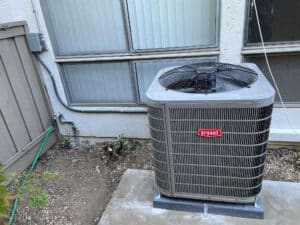Essential AC Maintenance Tips To Keep Your System Running Smoothly
With summer highs averaging 70°F, a reliable air conditioner is key to living comfortably in the Bay Area. Regular AC maintenance helps your system run smoothly, keeping your home cool while avoiding costly repairs.
Explore essential AC maintenance tips, learn ways to improve AC efficiency, and discover signs it’s time for professional AC maintenance from the expert team at TRIO.

Why Regular AC Maintenance Matters
Regular AC maintenance is a reliable way to keep your air conditioner running efficiently. Schedule a professional AC check-up at least once a year, ideally in the spring before the heavy-use season begins. In addition to cleaning the system to ensure it runs smoothly, professional maintenance also helps identify and address small problems before they become costly breakdowns.
Top AC Maintenance Tips Every Homeowner Should Know
Wondering how to maintain your AC unit? These seasonal AC maintenance tips help improve AC efficiency and reduce the risk of air conditioner breakdowns.
Change Filters Regularly
ENERGY STAR recommends checking your AC filters at least once a month and changing them at least every three months. Particularly during the heavy-use season, you may need to change your filters more frequently, so monthly inspections are important to assess the amount of buildup on the filter.
Clean the Condenser
The outdoor condenser unit pulls outside air into your system, but it can also pull in dust, dirt, and other debris. While smaller particles are caught in the air filters, larger items may clog the air intake on the condenser. Improve AC airflow by regularly inspecting the condenser, removing leaves and debris, and gently washing the unit with water and mild soap.
Protect the Unit During the Off-Season
Bay Area winters are typically mild, but it’s still a good idea to protect your AC when not in use. If you don’t use the system during the winter, consider turning it off and placing a cover over the outdoor unit to protect it from rain, dust, and debris.
Seasonal AC Maintenance Checklist
When your AC pro performs seasonal AC maintenance, they’ll typically follow an air conditioner maintenance checklist:
- Check, clean, or change air filters.
- Inspect the outdoor unit.
- Clean indoor and outdoor condenser coils.
- Check refrigerant levels.
- Inspect all electrical connections.
- Clean and lubricate mechanical parts.
- Clear the condensate drain line.
How To Improve AC Efficiency at Home
Learning how to improve AC efficiency at home helps extend the AC’s lifespan, save you money, and keep your home more comfortable.
Choose the Right AC Size
Correct AC sizing is key to improving efficiency. If your unit is too large, it may short-cycle as it tries to maintain the proper temperature. If the unit is too small, it may run constantly and burn out the fans. A qualified AC pro can help you find the best size for your home and energy needs.
Use a Programmable Thermostat
One of the biggest energy drains for an AC system is running it when you’re not home. A programmable thermostat makes it easy to reduce AC use when you’re away and when overnight outdoor temperatures drop. A smart thermostat automatically adjusts to temperature and occupancy levels.
Maintain Proper Airflow
Furniture and other items in front of vents force your AC to work harder to move air through your home. Check for items blocking the indoor vents or the intake vent for the outdoor condenser unit.
Insulate the System
Even if your AC unit is functioning properly, cold loss can still occur through your coolant lines, vents, and other components of the system. Make sure AC lines are insulated to minimize energy loss and inspect for leaks in your vents or other areas where air may escape.
Insulating your home and using Energy Star efficient windows help reduce energy loss and may even qualify you for energy rebates, depending on local legislation.

Signs Your Air Conditioner Needs Maintenance
If you notice any of the following signs, it’s time to call for routine AC service.
Loud Noises
When your air conditioning system is running properly, it usually produces a quiet, consistent sound. However, an air conditioner in need of maintenance may make loud and unusual noises, such as clanging, whirring, whining, or clunking. If your AC makes odd or new noises, it’s a sign to call for an AC inspection.
Bad Smells
A broken AC may produce a musty, burning, or sweet, chemical-like smell. Musty smells usually indicate mold or mildew, which can affect indoor air quality and should be cleaned out by a professional.
A burning or chemical smell needs immediate attention. Burning usually means a fire hazard, while a chemical smell can indicate a toxic refrigerant leak. If you smell either of these things, turn off your AC, evacuate the home, and call a pro for repairs.
AC Turning Off and on Again
A typical AC cycle includes about 15 to 20 minutes on, followed by about 15 to 20 minutes off. Depending on your unit and the temperature in your home, this may be slightly shorter. However, if your AC is turning rapidly on and off (with cycles lasting less than 10 minutes), this can indicate AC short cycling and means the unit is due for inspection.
Rising Energy Bills
If you’ve noticed a jump in your utility costs, it’s a good sign that it’s time for AC maintenance. A gradual rise may indicate wear and tear, while a sudden spike can mean a broken component. Maintenance can help get your energy bill back where it belongs.
The Benefits of Scheduling Professional AC Tune-Ups
There are many benefits to professional AC tune-ups, including reducing AC repair costs, boosting home safety and indoor air quality, and extending AC lifespan.
Avoid Costly Repairs
Unaddressed AC issues can quickly escalate into more significant problems, resulting in costly repairs. Calling an AC pro at the first sign of a problem is the best way to prevent a major AC breakdown and keep your home cool.
Improve Home Safety
While air conditioners are generally very safe, even the best units can become a problem when worn or damaged. Regular AC maintenance helps identify potential issues, such as fire hazards and refrigerant leaks, before they become a risk to your family. Routine cleaning and maintenance also help reduce mold and mildew, improving the air quality in your home.
Prolong AC Lifespan
Modern air conditioners typically have a lifespan of 15 to 20 years when well-maintained. Routine professional AC maintenance reduces wear and tear, helping you get the most out of your air conditioner.

Book an AC Maintenance Appointment With TRIO Heating, Air & Plumbing
Keep your AC running smoothly and avoid costly repairs with annual professional maintenance. Our team of licensed pros at TRIO Heating, Air & Plumbing provides expert tools and great customer service to your Bay Area home. Contact us today to book your next appointment and keep your air conditioner working at its best.
